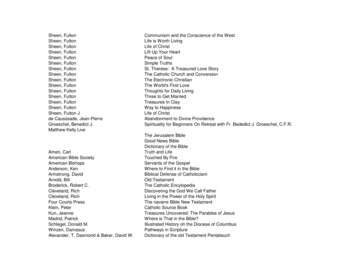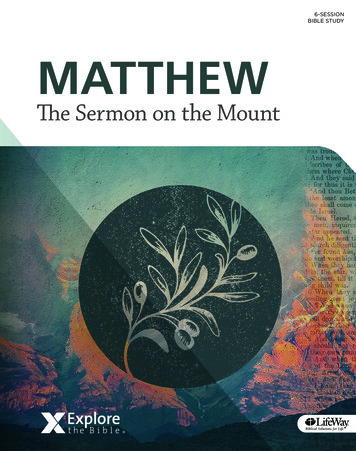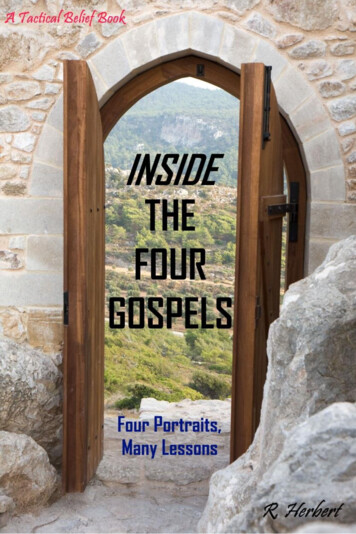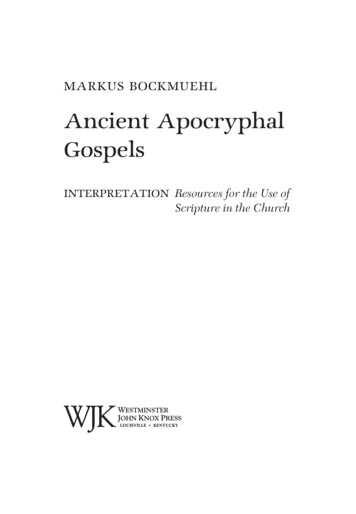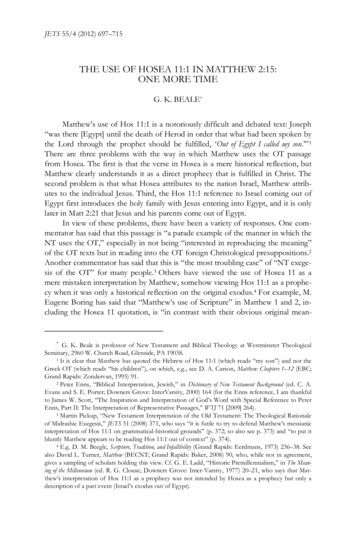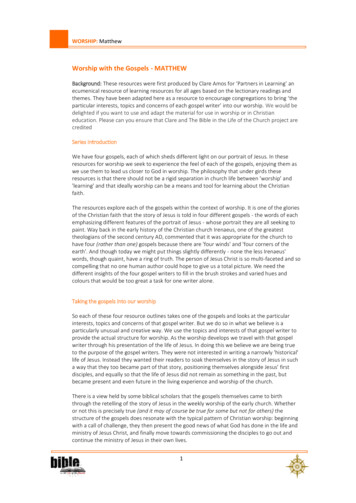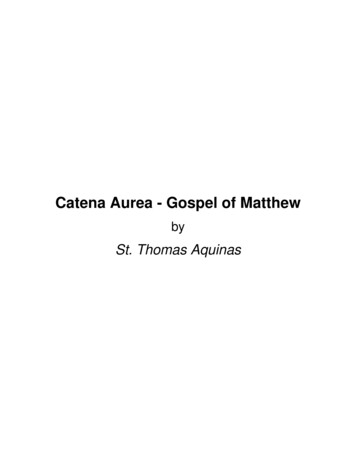
Transcription
The Gospel ofMATTHEWpart ofThe Holy BibleA New Translation From the GreekbyDavid Robert Palmeravailable /And possibly coming .xipfs://drpbible.nftipfs://ebibles.xPrinted Edition Available on Amazonhttp://bit.ly/PrintPostWSMay 2022 Edition(First Edition was April 2003)The textual variant data in my footnote apparatus are gathered from the United Bible Societies’ Greek NewTestament 3rd Edition (making adjustments for outdated data therein); the 4 th Edition UBS GNT, the UBS TextualCommentary on the Greek New Testament, ed. Metzger; the NA27 GNT; Swanson’s Gospels apparatus; the onlineMünster Institute transcripts, and from Wieland Willker’s excellent online textual commentary on the Gospels.NOTE about the manuscripts and other witnesses cited in this footnote apparatus: people have criticized this andother TC apparatuses for "cherry-picking" which manuscripts they cite. There is some truth to that, so to remedythat situation, I have decided to use only one criterion and it is an objective one, and that is, I now cite ALLwitnesses 8th century and earlier, (ones I have access to) and I cite NO witnesses later than the 8th century. That isfair, and indisputable. This saves space, and document size and download time as well. There certainly are enoughwitnesses to Matthew before the 9th century such that we can get an accurate picture of the text. A table of thesewitnesses may be found after the gospel.You do not need anyone's permission to quote from, store, print, photocopy, re-format or publish thisdocument.Just do not change the text. If you quote it, you might put (DRP) after your quotation if you like.
1The Good News According toMATTHEWChapter 1The Genealogy of Jesus¹A record of the genealogy of Jesus1 the Christ, the son of David, the son of Abraham:²Abraham begot Isaac,and Isaac begot Jacob,and Jacob begot Judah and his brothers,³and Judah begot Perez and Zerah,by Tamar,and Perez begot Hezron,and Hezron begot Ram,⁴and Ram begot Amminadab,and Amminadab begot Nahshon,and Nahshon begot Salmon,⁵and Salmon begot Boaz, by Rahab,and Boaz begot Obed, by Ruth,and Obed begot Jesse,⁶and Jesse begot David the King.David2 begot Solomon, by her who belonged to Uriah,⁷and Solomon begot Rehoboam,and Rehoboam begot Abijah,and Abijah begot Asa,3NOTE about the manuscripts and other witnesses cited in this footnote apparatus: people have criticized this andother TC apparatuses for "cherry-picking" which manuscripts they cite. There is some truth to that, so to remedythat situation, I have decided to use only one criterion and it is an objective one, and that is, I now cite ALL witnesses8th century and earlier, (ones I have access to) and I cite NO witnesses later than the 8th century. That is fair, andindisputable. This saves space, and document size and download time as well. There certainly are enough witnessesto Matthew before the 9th century such that we can get an accurate picture of the text. A table of these witnessesmay be found after the gospel.1 1:1 Greek, Ἰησοῦς (Iēsoȗs), "Yaysoos," from the Hebrew ( יֵׁשּוע yēšûʿa) "Yayshua," which was a later form of theHebrew name of Joshua, ( יְ ֹהוׁשּוע yəhōšȗʿa) "Y'hoshua." Y'hoshua in turn had developed by vowel dissimilationfrom the original Yəhoshua, "Yah is salvation."2 1:6 txt Δαυὶδ δὲ¹ ℵ B itk vgmss syrs,c,p copsa,bo arm Did NA27 {\} ‖ Δαυὶδ δὲ ὁ βασιλεὺς C E L W lat syrh geo (TRΔαβὶδ) RP ‖ lac A D N P.3 1:7-8 txt Ἀσα L W Σ it(a),f vg syrc,s,p,h,pal Ps-Eustathius (Epiphanius½) TR HF RP ‖ Ἀσαφ ¹ ℵ B C* (DLuke) itaur,(dLuke),k,qvgmss (syrhmg) copsa,meg,bo arm eth geo (Epiphanius½); Ambrose NA27 {B} ‖ lac ⁴⁵ A D N P Φ. In the genealogy in IChronicles 3:10 most Greek manuscripts read Ἀσα, though MS 60 reads Ἀσαβ. In Antiquities VIII.XI.3—xii.6 Josephususes Ἀσανος, though in the Latin translation Asaph appears. The man's name, of course, was Asa. Is it not written inthe annals of the kings of Israel and Judah? This variant is not a big deal, since Asaph appears to be just a variantspelling of Asa; probably as a result of passing through different languages. The New Testament has many examplesof this phenomenon. A Hebrew word cannot end in a vowel, so I suspect that the glottal stop consonant which endsthe Hebrew name was substituted with some other consonant in other languages. In Hebrew, the name Asa beginsand ends with the letter ℵ (Aleph), which is a consonant, a glottal stop. Other languages, (including Greek) which donot have a letter for the glottal stop, substituted other consonants for it. The confusion of terminal glottal stopswith other unvoiced consonants happens often in English as well, since English has no letter for the glottal stop.(Though in transliteration schemes, the single straight apostrophe is used to represent the glottal stop.) In very
2⁸and Asa begot Jehoshaphat,and Jehoshaphat begot Joram,and Joram begot Uzziah,⁹and Uzziah begot Jotham,and Jotham begot Ahaz,and Ahaz begot Hezekiah,¹⁰and Hezekiah begot Manasseh,and Manasseh begot Amon,4and Amon begot Josiah,¹¹and Josiah begot Jeconiahand his brothers at the time ofthe exile to Babylon.¹²After the exile to Babylon:Jeconiah begot Shealtiel,and Shealtiel begot Zerubbabel,¹³and Zerubbabel begot Abiud,and Abiud begot Eliakim,and Eliakim begot Azor,¹⁴and Azor begot Zadok,and Zadok begot Akim,and Akim begot Eliud,¹⁵and Eliud begot Eleazar,and Eleazar begot Matthan,and Matthan begot Jacob,¹⁶and Jacob begot Joseph,the husband5 of Mary,of whom6 was born Jesus,the one called the Christ.¹⁷Thus there were fourteen generations in all from Abraham to David, fourteen from David tothe exile to Babylon, and fourteen from the exile to the Anointed One.7ancient Greek, the letter φ was pronounced like our letter p, it was not an "f." In English today, words ending in poften sound like they end in a glottal stop. That is, we do not aspirate the p as we would if the p was in the middle ofa word, but simply shut off the exhaled air by closing our lips.4 1:10 txt Ἀμών, Ἀμὼν E L W Σ it(a) vg(mss) syrc,s,p,h,pal copmeg (Ps-Eustathius); Augustine TR HF RP ‖ Ἀμμών, Ἀμμὼνitaur,f ‖ Ἀμνων, Ἀμως B* ‖ Ἀμώς, Ἀμὼς ℵ Bc C (DLuke) itc,dLuke),ff¹,k,q vgmss (syrhmg) copsa,bo,fay arm eth geo Epiphanius;Ambrose NA27 {B} ‖ lac ⁴⁵ A D N P Φ. In the LXX of 1 Chron. 3:14, most manuscripts read Ἀμων, but A B c read Ἀμως,and B* and one minuscule read Ἀμνων. Further, in 2 Kings 21:18, 19, 23-25 and 2 Chronicles 33:20-25, several Greekmanuscripts read Ἀμως. It is admitted by almost all that Ἀμως is an error, whether by LXX scribes, Matthew, oranother scribe.5 1:16a See the endnote at the end of this document comparing this genealogy to Luke's genealogy.6 1:16b τὸν ἄνδρα Μαρίας, ἐξ ἧς ἐγεννήθη Ἰησοῦς ὁ λεγόμενος Χριστός is the reading of¹ ℵ B C E P L W Σvid itaur,f vgp,h,palsasyrcop (arm) (eth) geo TR HF RP NA27 {A} ‖ lac ⁴⁵ A D N Φ. Other witnesses, Θ ƒ¹³ ℓ 547 and some Italic, Syriacand Coptic versions add various words and phrases in order to clarify the ambiguity of whether Matthew was sayingthat Jesus was begotten of Joseph, or of Mary. But the original wording can be properly understood as meaning bornof Mary. It should also be mentioned that two Hebrew Matthew manuscripts have been found by Jewish textualscholar Nehemia Gordon which say here that this genealogy is of the "father" of Mary.7 1:17 Matthew skips after Josiah, Jehoiakim and Jehoiachin (2 Kings 23:34 - 24:6). And his last set of generations areonly 13, not 14. So this arrangement must be a teaching or memorization aid. Another interesting thing is thatfourteen plus fourteen plus fourteen equals six groups of seven generations, 42 in all (6 sevens). In Hebrew, in theOld Testament, a group of seven of something is called a week of something. There were six weeks of generationsprior to the Messiah, and the Messiah ushered in the seventh week, the Sabbath week of generations. The Messiahbrought in another rest from creation. As God took six days to create the First Adam, and then he ceased, so God alsotook six weeks of generations to create the Second Adam, and then he ceased.
3The Birth of Jesus¹⁸This is how the birth8 of Jesus Christ came about. His mother Mary was pledged to bemarried to Joseph, but before they consummated, she was found to be pregnant, from the HolySpirit. ¹⁹But her husband Joseph, being a righteous man, did not want to make an example of her,and planned to divorce her secretly.²⁰But while he was mulling these things over, an angel of the Lord appeared to him by means ofa dream, and said, "Joseph son of David, do not be afraid to take Mary home as your wife, forwhat is conceived in her is by the Holy Spirit. ²¹She will give birth to a son, and you are to callhis name Jesus, because he will save his people from their sins."9²²All this took place in order that what was said by the Lord through the prophet would befulfilled, which says: ²³"Behold, the virgin shall be pregnant, and shall bear a son, and they shallcall his name Immanuel,"10 which when translated is, "God with us."²⁴And when Joseph awoke from his sleep, he did what the angel of the Lord had commandedhim, and he took his bride home. ²⁵But he did not know her11 until she gave birth to her firstbornson.12 And he called his name Jesus.Chapter 2The Visit of the Magi¹Now after Jesus had been born in Bethlehem of Judea, in the days of King Herod, behold,Magi13 from out of the east showed up in Jerusalem, ²saying, "Where is the one born king of theJews? For we saw his star in the east14 and have come to worship him."1:18 txt γένεσις ¹ ℵ B (C W γενεσεις) L (P γένησις) Z Σ arm Euseb Ps-Ath NA27 {B} ‖ γέννησις E L ita,aur,b,d,f,k,q vgIrenGr Or Didydub Epiphan Chrysost Theodotus-Ancyra Nestorius; Chromat Jer Aug TR HF RP ‖ lac ⁴⁵ A D N Φ.9 1:21 The Greek name, Ἰησοῦς (Iēsoȗs), came from the Hebrew ( יֵׁשּוע yēšûʿa)"Yayshua," which was a later form of8the Hebrew name of Joshua, ( יְ ֹהוׁשּוע yəhōšȗʿa) "Y'hoshua." Yeshua means "salvation."10 1:23 Isaiah 7:1411 1:25a "Did not know her" is a euphemism meaning, "he did not have sex with her."12 1:25b txt τόν υἱόν αὐτής τὸν πρωτότοκον C Dc (D* L itd,q omit αὐτής) E N W Σ 087 it aur,f,ff¹ vg syrp,h,palmss arm ethDiatesaron Cyril-Jerusalem Didymus Didymusdub Epiphanius Chrysostom Proclus; Jerome Augustine ΤR HF RP ‖ υἱόνℵ B Z 071vid (copsa υἱόν αὐτής) itb,k syrs,c,palmss (copbo τόν υἱόν) copmeg geo Ambrose Chromatius NA27 {A} ‖ lac ⁴⁵ A PΦ. Adding the words τόν before the word υἱόν, "son," and "her firstborn son," as all manuscripts have in Luke 2:7,would help clarify that sexual intercourse, brought up here, did not take place before Mary's firstborn. Yet, adding“firstborn son” still does not make it clear that she had not already had a daughter. It is much easier to explain why the words"her firstborn son" might have been added, than to explain why they might have been deleted. The story,regardless, still makes clear that Jesus was her firstborn, and that Mary was a virgin prior to the time of Jesus beingborn.13 2:1 Plural of Magus, one trained in astrology and dream interpretation, probably in a tradition based onZoroastrianism, founded by the Persian prophet Zarathustra or Zoroaster.14 2:2 Or in the rising. Also in verse 9. The same Greek word, is used for both "east" and "rising," since because ofthe direction of the rotation of the earth, heavenly bodies "rise" in the east. The word star does not necessarily mean afar off sun. It could have meant any heavenly body or sign. This star or sign was something only the trainedastrologers saw, and not the king of Israel or the general public. In near-eastern astrology of that era, a conjuction wasvery significant, and the constellation Aries represented Herod's kingdom in palestine. Furthermore, signs involvingthe planet Jupiter (Zeus) represented royalty and kings. So if there was a sign or conjunction involving Jupiter,theMagi would take note. Jupiter was in retrograde motion in April of the year 6 B.C. Thus, that star would "stand still."We know from the gospel of Luke that the shepherds were "keeping watch over their flocks by night." They only didthat during birthing time, to protect the ewes and newborn lambs. In other words, they did that during Spring time.Furthermore, Luke says in Luke 2:42 that Jesus turned 12 years old around Passover time. Astronomer MichaelMolnar ael-molnar-phd71/ ) has found that there was aconjunction of Jupiter (while retrograde and "standing still') with the moon, in Aries, on April 17, 6 B.C. This wouldharmonize with Luke's spring timing, and also with the fact that both Matthew and Luke say Jesus was born during thereign of Herod, who died in 4 B.C. Thus I say it is practically certain that Jesus was born in spring time, and that April17, 6 B.C. is the best theory put forth yet as to his exact day of birth. One thing we know for certain is that his birthday
4³Upon hearing this, King Herod was disturbed, and all Jerusalem with him. ⁴And havingassembled all the chief priests and Torah scholars of the people, he inquired of them as to wherethe Messiah was to be born.⁵And they told him, "In Bethlehem in Judea, for this is what has been written through theprophet:⁶" 'And you, Bethlehem, in the landof Judah,are by no means least amongthe rulers of Judah;for out of you will come a rulerwho will be the shepherd ofmy people Israel.'15"⁷Then Herod called the Magi secretly and ascertained from them what time the star hadappeared. ⁸And he sent them to Bethlehem and said, "Go and search diligently for the child. Andwhen you have found him, bring word back to me, so I may come and worship him also."⁹After they had heard the king, they went on their way, and lo, the star, the one they had seen inthe east, kept moving on in front of them, until it arrived and stopped over where the child was.¹⁰When they saw the star, they rejoiced with a surpassingly great joy. ¹¹And upon coming to thehouse, they saw the child with his mother Mary, and they fell prostrate and worshipped him.Then they opened their treasures, and presented him with gifts of gold, and of incense and ofmyrrh. ¹²And having been warned in a dream not to return to Herod, they went back to theircountry by another route.The Escape to Egypt¹³And when they had gone, behold, an angel of the Lord appears in a dream to Joseph, saying,"Get up, take the child and his mother, and flee into Egypt, and be there until I tell you, for Herodintends to search for the child to destroy him."¹⁴So he got up, took the child and his mother during the night, and escaped into Egypt, ¹⁵andwas there until the death of Herod, in order that the thing spoken by the Lord through the prophetwould be fulfilled, which says: "Out of Egypt I called my son."16¹⁶When Herod realized that he had been fooled by the Magi, he was extremely enraged, andsent orders and did away with all the male children17 in Bethlehem and all its environs who weretwo years old or under, in accordance with the time he had ascertained from the Magi. ¹⁷Thenwhat was said through the prophet Jeremiah was fulfilled, which says:¹⁸"A voice heard in Ramah,a weeping and loud wailing,Rachel weeping for her childrenand refusing to be comforted,because they are no more."18was not December 25th, or any time in the winter, when the sheep in Judea would be in pens, and not in the field in thecold.15 2:6 Micah 5:216 2:15 Hosea 11:117 2:16 Greek: παῖδας - paȋdas. It is the masculine form of the word. If Matthew had intended to include girls, he couldhave added the feminine form, παιδίσκας (paidískas), like Luke did in Luke 12:45; Diatessaron 19:26.18 2:18 Jeremiah 31:15
5The Return to Nazareth¹⁹And after Herod died, behold, an angel of the Lord appears by a dream to Joseph in Egypt,²⁰saying, "Get up, take the child and his mother and go into the land of Israel, for those who wereseeking the child's life are dead."²¹So he got up, took the child and his mother and entered the land of Israel. ²²But when heheard that Archelaus was reigning in Judea in place of his father Herod, he was afraid to go there.And having been warned in a dream, he withdrew to the district of Galilee, ²³and went and livedin a town called Nazareth, so that what was spoken through the prophets would be fulfilled, thathe would be called a Nazarene.19Chapter 3John the Baptizer Prepares the Way¹In those days John the Baptizer appears, preaching in the desert, ²saying, "Repent, for thekingdom of heaven has drawn near." ³This is the one spoken of through Isaiah the prophet:"A voice calling in the wilderness,'Prepare the way for the Lord,make the paths straight for him.20⁴This man21 John had clothing of camel's hair and a leather belt around his waist, and his foodwas locusts and wild honey. ⁵At that time Jerusalem and all Judea and the whole region of theJordan went out to him. ⁶And confessing their sins, they were baptized by him in the JordanRiver.⁷But when he saw many of the Pharisees and Sadducees coming to the baptism, he said to them,"You spawn of snakes! Who warned you to flee from the coming wrath? ⁸Then produce fruitcharacteristic of repentance. ⁹And do not think you can say to yourselves, 'We have Abraham asour father.' For I tell you that out of these stones God can raise up children for Abraham. ¹⁰Andthe ax is already set to the root of the trees. Every tree therefore not producing good fruit is cutdown and thrown into the fire.¹¹"I baptize you in water for repentance, but after me will come one who is more powerful thanI, whose sandals I am not worthy to remove. He will baptize you in the Holy Spirit and in fire: 22¹²his winnowing fork is in his hand, and he will clear out his threshing floor, gathering the wheatinto the barn, but the chaff he will burn up with fire unquenchable."The Baptism of Jesus¹³At that time Jesus arrives at the Jordan, out of Galilee, to John, to be baptized by him. ¹⁴ButJohn tried to deter him, saying, "I need to be baptized by you, and you are coming to me?"2:23 Greek: Ναζωραῖος - Nazōraios A Nazarene is someone from the town of Nazareth, just as a Houstonian issomeone from the city of Houston. A Nazarene is not to be confused with a Nazirite, which is someone who took atime-limited vow not to cut his hair or to eat grapes or drink wine. We know Jesus was not a Nazirite, because hedrank wine. But what Old Testament prophecies was Matthew referring to? See the endnote at the end of thisdocument, which addresses this question at length.20 3:3 Isaiah 40:321 3:4"He was a man dressed in hairs, with a leather belt around his waist." "It is Elijah." II Kings 1:7-9 A garment of hairwas a mark of a prophet, Zechariah 13:4. "What kind of man did you go out to see?" Matthew 11:7-1422 3:11 txt {C} πνεύματι ἁγίῳ καὶ πυρί ¹⁰¹vid ℵ B C L W latt syrc,p,h copsa,bo Origen Basil TR NA27 SBL {\} ‖ πνεύματιἁγίῳ E syrpal RP ‖ πυρί καὶ πνεύματι ἁγίῳ syrs ‖ lac A D N P Φ. Codex B has an umlaut. The addition of καὶ πυρί maybe a harmonization to Luke.19
6¹⁵In reply, Jesus said to him, "Permit it now; it is proper for us to complete all righteousness thisway." Then John consented.¹⁶As soon as he was baptized, Jesus came up out of the water, and behold, the heavens wereopened, and he saw the Holy Spirit of God coming down like a dove, coming onto him. ¹⁷Andbehold, a voice from the heavens, saying, "This is my Son, whom I love; with whom I am wellpleased."Chapter 4The Temptation of Jesus¹Then Jesus was led up into the desert by the Spirit, to be tempted by the devil. ²And he fastedforty days and forty nights, and afterward he was hungry. ³The tempter came to him and said, "Ifyou are the Son of God, command that these stones become loaves of bread."⁴But he in answer said, "It is written, 'Man shall not live on bread alone, but on every word23coming out of the mouth of God.'24"⁵Then the devil takes him into the holy city and had him stand on the gable of the temple, ⁶andhe says to him, "If you are the Son of God, throw yourself down. For it is written:'He will command his angelsconcerning you;and they will lift you up on their hands,so you will not strike yourfoot against a stone.'25"⁷Jesus said to him, "It is also written: 'You shall not put Yahweh your God to a test.'26"⁸Again, the devil led him to a very high mountain, and showed him all the kingdoms of theworld and their splendor, ⁹and said to Jesus, "These I will give to you, if you will fall down andworship me."¹⁰Then Jesus said to him, "Go away, Satan!27 For it is written: 'You shall worship Yahwehyour God, and him only shall you serve.'28"¹¹Then the devil left him alone, and lo, angels had come and were attending him.Jesus Begins to Preach¹²And when he heard that John had been arrested, he went away to Galilee. ¹³And forsakingNazareth, he went and lived in Capernaum, beside the sea, in the territory of Zebulun andNaphtali, ¹⁴so that the thing spoken through Isaiah the prophet might be fulfilled, which says:¹⁵"Land of Zebulun and land of Naphtali,the road by the sea,on the other end of the Jordan,Galilee of the Gentiles—23 4:4a Upon every ῥήμα - hreema that proceeds from the mouth of God. In Hebraistic Greek, ῥήμα was used notonly for words or statements, but when combined with the Greek word πᾶν "pan" it means "every matter" or "everything." See for example how some translations rendered Deuteronomy 8:3 as "everything that comes from themouth of God."24 4:4b Deuteronomy 8:325 4:6 Psalm 91:11,1226 4:7 Deuteronomy 6:1627 4:10a The Textus Receptus has here after the word Ὕπαγε, "go away," the words ὀπίσω μου - "behind me." Thoseare the words Jesus said to Peter in Matthew 16:23 and Mark 8:33. The UBS editorial committee gives the readinghere without the words "behind me" an A rating of certainty.28 4:10 Deuteronomy 6:13
7¹⁶the people sitting in darknesshave seen a great light;and on those sitting in the land of theshadow of death29a light has dawned."30¹⁷From that time on Jesus began to preach and to say, "Repent, for the kingdom of heaven isnear."The Calling of Simon, Andrew, James, and John¹⁸And walking beside the Sea of Galilee, he saw two brothers, Simon called Peter, and hisbrother Andrew, casting a net into the sea, for they were fishers.¹⁹And he says to them, "Come you two, follow me, and I will make you fishers of people."²⁰And they followed him immediately, leaving the nets.²¹And going on from there, he saw another set of two brothers, James the son of Zebedee andhis brother John, in the boat with their father Zebedee, mending their nets, and he called them.²²And they immediately followed him, leaving the boat and their father.Jesus Heals the Sick²³And he went around through all of Galilee, teaching in their synagogues, and proclaiming thegood news of the kingdom, and healing every disease and sickness among the people. ²⁴Andnews about him spread all over Syria, and they brought to him all who were ill with variousdiseases and severe pain, the demon-possessed, and epileptics and the paralyzed, and he healedthem. ²⁵And many crowds followed him, from Galilee and the Ten Cities, and from Jerusalemand Judea, and beyond the Jordan.Chapter 5The Beatitudes¹And seeing the crowds, he went up to the mountainside. And when he sat down his disciplescame to him, ²and opening his mouth, he began to teach them, saying:³"Blessed are the poor in spirit,31for theirs is the kingdom of heaven.⁴Blessed are those who mourn,for they will be comforted.⁵Blessed are the meek,for they will inherit the earth.⁶Blessed are they who hunger and thirstfor righteousness,for they will be satisfied.4:16a Compare Isaiah 9:1 in the LXX: οἱ κατοικοῦντες ἐν χώρᾳ καὶ σκιᾷ θανάτου, φῶς λάμψει ἐφ’ ὑμᾶς, where the"kai" is not present between "region" and "shadow." Compare also Luke 1:79: ἐπιφᾶναι τοῖς ἐν σκότει καὶ σκιᾷθανάτου καθημένοις. Compare also Psalm 22:4 in the LXX: ἐν μέσῳ σκιᾶς θανάτου; Job 12:22: ἐξήγαγεν δὲ εἰς φῶςσκιὰν θανάτου.30 4:16 Isaiah 9:1, 231 5:3 The meaning of the expression poor in spirit is difficult to determine with certainty. Bauer says the sense isprobably those who are poor in their inner life, not having a Pharisaic confidence in their own spiritual adequacy. But Ithink the meaning is that we should, even if we are materially rich, live as though we were poor. As the apostle Paulsays also in I Cor. 7:30-31: "those who buy, should live as though they did not possess, and those who use this world,as though they did not make full use of it."29
8⁷Blessed are the merciful,for they will be shown mercy.⁸Blessed are the pure in heart,for they will see God.⁹Blessed are the peacemakers,for they will be calledoffspring of God.32¹⁰Blessed are those who are persecutedbecause of righteousness,for theirs is the kingdom of heaven.¹¹"Blessed are you when people insult you, persecute you and falsely say all kinds of evilagainst you because of me. ¹²Rejoice and be glad, because great is your reward in heaven, for inthe same way they persecuted the prophets before you."Salt and Light¹³"You are the salt of the earth. But if the salt is blanded down, with what will it be made salty?It is no longer potent enough for anything except to be thrown outside and trampled underfoot ofpeople.¹⁴"You are the light of the world. A city set on a hill cannot be hidden. ¹⁵Neither do they light alamp to put it under a basket, but rather on the stand, so it enlightens all those in the house. ¹⁶Inthe same way, let your light shine in the view of people, such that they will see your good worksand give glory to your Father who is in heaven.The Fulfillment of the Law¹⁷"Do not think that I have come to abolish the Law or the Prophets; I have not come to abolishthem but to fulfill them. ¹⁸For truly I say to you, until the sky and the earth pass away, not oneiota,33 not one serif,34 will by any means pass away from the Law until everything is carried out.¹⁹Therefore, whoever looses one of the least of these commandments, and teaches people thesame, will be called least in the kingdom of heaven, but whoever practices them and teachesthem, this one will be called great in the kingdom of heaven. ²⁰For I tell you that unless your5:9 The Greek word here is υἱοὶ, "sons." The word children can sound like it emphasizes the immaturity of thesubjects. I also considered the word "offspring," because that would convey part of what is emphasized here. Whatis emphasized by this passage is two-fold: the fact that offspring of a father bear resemblance in personality, values,and quality of the "faith of their fathers," and two, that these sons are heirs of their father, heirs of a future kingdom.The word "sons" is said to have been a legal term, and was gender inclusive. It included daughters. Today, the word"son" legally means, according to Black's Law Dictionary, 6th Ed., "Male offspring. An immediate male descendant.The word may be applied also to a distant male descendant. In a broad use, term may be employed as designatingany young male person, as a pupil, a ward, an adopted male child or dependent." This current legal definitiongreatly limits the acceptability of this word. "Children" is defined as: Progeny, offspring of parentage. Unborn orrecently born human being. At common law one who had not attained the age of fourteen years, though themeaning now varies in different statutes." This definition, which includes the idea of being offspring, and is genderinclusive as well, makes the word "children" perhaps the best choice. This is also the word that Tyndale used, andthe King James Version as well. Black's Law Dictionary, Copyright 1990, West Publishing Co., St. Paul, Minnesota,All Rights Reserved.33 5:18a The Greek says ἰῶτα (iōta), which is the spelling out of the name of the ninth letter of the Greek alphabet. Itis the smallest letter of that alphabet, and even smaller when it is "subscript." When the iota is subscript, it is placedunder another vowel and in even smaller size, and the difference it makes is the part of speech of the word, or the"case." But now, an objection may arise: "But the Law was given in Hebrew, not Greek." The spoken names of theGreek letters "iota" and the Hebrew letter "yodh" sounded more similar then than they do now. They even looksimilar in written form. And both are the smallest letters of their respective alphabets. Now there was a veryimportant Greek translation of the Hebrew Old Testament, called the Septuagint, which was widely used by Jesus'time, whereas the Hebrew language was in danger of dying as a spoken language.34 5:18b In the Hebrew language, sometimes the only difference between two different Hebrew letters is a "serif" or alittle horn attached, just a slight little appendage.32
9righteousness surpasses that of the Torah scholars and Pharisees, you will by no means enter thekingdom of heaven.Adversaries²¹"You have heard that it was said to the people of long ago, 'Do not murder,35 and anyone whomurders will be subject to judgment.'36 ²²But I tell you that anyone who is angry with hisbrother37 will be subject to judgment. And anyone who says to his brother, 'Raca,38' is answerableto the council.39 But anyone who says, 'You fool!' will be in danger of the fire of Gehenna.405:21a Exodus 20:13. This word φονεύω - phoneuw did not mean just murder, but homicide in general, including bycarelessness or negligence, and manslaughter. See for example Deuteronomy 19:6; Joshua 21:13. And the wordphoneuw did NOT include in its meaning the killing of non-human life. It was not used for the killing of animals.Perhaps this verse would be better rendered, "Do not murder a human."36 5:21b This is because the judgment, a trial, was necessary for the purpose of deciding whether the homicide wasjustifiable or not. Not all homicide was punishable. The Law of Moses was full of discussion as to which killings of ahuman being were punishable, and which were not. In the same way, later in verse 22, if you are angry with yourbrother, you are subje
Commentary on the Greek New Testament, ed. Metzger; the NA27 GNT; Swanson's Gospels apparatus; the online Münster Institute transcripts, and from Wieland Willker's excellent online textual commentary on the Gospels. NOTE about the manuscripts and other witnesses cited in this footnote apparatus: people have criticized this and

